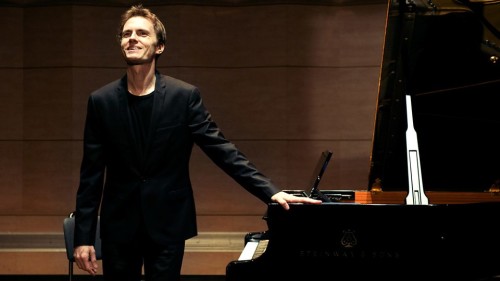 United Kingdom Couperin, Beethoven, Debussy: Alexandre Tharaud (piano), Wigmore Hall, London, 19.11.2018. (DD)
United Kingdom Couperin, Beethoven, Debussy: Alexandre Tharaud (piano), Wigmore Hall, London, 19.11.2018. (DD)

Couperin – 6 selections from Pièces de Clavecin
Beethoven – Sonata No.30 in E major Op.109, Sonata No.32 in C minor Op.111
Debussy – Prélude à l’après-midi d’un faune (arranged by Alexandre Tharaud)
With his superb technique and individual approach to performance, Alexandre Tharaud has established himself as one of today’s leading pianists. He has also created an overwhelmingly beautiful piano arrangement of Debussy’s Prelude to the Afternoon of a Faun, but more on that later.
This concert took place in London’s Wigmore Hall, a venue built next to the showrooms of Bechstein Pianofortefabrik, manufacturers of the once famous piano. The performance space, originally named Bechstein Hall, is now known as Wigmore Hall, and has been since 1917. The venue has a capacity of 550+ and rightly boasts of its impressive sound.
Tharaud began with a selection of pieces from the too rarely performed Pièces de Clavecin by French Baroque composer François Couperin. These are character pieces – Couperin published well over 200 of them between 1713 and 1730 – grouped in suites called ordres. Tharaud created his own ordre here by selecting six pieces which included a tribute to another musician; characters from a satirical play; reeds (‘Les Roseaux’); a relatively well-known passacaglia; a dissonant and languid ode to the ‘wandering shades’; and, to conclude, the delightful ‘Le tic-toc-choc, ou les Maillotins’. It is music written for an artist like Tharaud, whose skill enables him to express himself in myriad voices and to bring out the widest range of emotion and sentiment, all the while honoring and respecting eighteenth-century style and manner.
Also on the program were two of Beethoven’s last three piano sonatas: Nos.30 and 32 (the final one). Tharaud’s approach to these masterpieces was sure and clean – there’s no question of his exceptional technique – and they were also interestingly idiosyncratic. This was particularly true of No.32, where the solace and closure that conclude the work seemed delayed, even stinted. The pianist’s conception was at odds with my own and provocative in the best of ways.
The highlight of the evening was Tharaud’s arrangement of Debussy’s Prélude à l’après-midi d’un faune. It is a pioneering work in music literature, one that has no antecedent, and the program notes for this performance succinctly described the harmonic motion as ‘instinctive drifting from chord to chord in support of the all-important melodic line’. The miracle of Tharaud’s playing lies in his own instinctive coloring and phrasing, with subtle dynamics, constructions and pianistic touches that all serve to support the melodic line. My fellow listener and I stared in amazement time and time again at this virtuosic performance, marveling as he set and fitted the acoustic pieces seamlessly together, with no borders in the sound production. These beautiful sonorities ruled the performance and were unlike anything I had ever heard before.
Douglas Dutton
